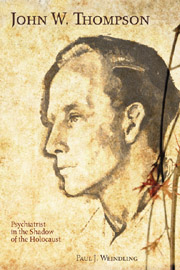Book contents
- Frontmatter
- Contents
- List of Illustrations
- Acknowledgments
- List of Abbreviations
- Part One Into the Dark
- Part Two Redemption
- 9 Belsen, “My Crucifix”
- 10 Medical War Crimes Revelations
- 11 Experimental Ethics
- 12 Therapist for the German Patient
- Part Three Aftermath
- Appendix John Thompson's Writings
- Notes
- Sources
- Index
11 - Experimental Ethics
from Part Two - Redemption
Published online by Cambridge University Press: 12 September 2012
- Frontmatter
- Contents
- List of Illustrations
- Acknowledgments
- List of Abbreviations
- Part One Into the Dark
- Part Two Redemption
- 9 Belsen, “My Crucifix”
- 10 Medical War Crimes Revelations
- 11 Experimental Ethics
- 12 Therapist for the German Patient
- Part Three Aftermath
- Appendix John Thompson's Writings
- Notes
- Sources
- Index
Summary
Formulating Consent
By the summer of 1946, Thompson had persuaded the British, the Americans, and the French to recognize “medical war crimes” as a special category for prosecution. The accumulating evidence on medical criminality prompted chief prosecutor Telford Taylor to instigate the medical trial. On August 15, 1947, when the judges delivered their verdict, they promulgated a set of guidelines on human experiments requiring the “voluntary consent” of human research subjects. What was John Thompson's contribution to the momentous code?
Thompson had conceived of an ethical evaluation and statement at an early stage in his campaign to draw attention to medical war crimes. A moral and philosophical analysis to guide scientists and physicians was necessary to prevent future abuses. In January 1946, Edward Mellanby, the physiologist and secretary of the MRC, was visited by “the Scotsman,” Thompson, and noted, “he asked me what I thought about a statement being made on an international plane by scientific men repudiating all this kind of work.”
Thompson's campaign for ethical judgment on Nazi medicine proves that he had recognized the need for an ethical agenda by late 1945. Robert P. Patterson, the U.S. Secretary of War, sent Andrew Ivy (representing the American Medical Association) on a mission to Germany and France from July 18 to August 12, 1946, to study the problem of human experiments, coordinate with the British at FIAT, and attend the July 31 meeting at the Pasteur Institute.
- Type
- Chapter
- Information
- John W. ThompsonPsychiatrist in the Shadow of the Holocaust, pp. 137 - 158Publisher: Boydell & BrewerPrint publication year: 2010

